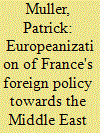| Srl | Item |
| 1 |
ID:
118006


|
|
|
|
|
| Publication |
2013.
|
| Summary/Abstract |
France's prominent role in Europe's policy towards the Arab-Israeli conflict represents an interesting case study for the evolving research on Europeanization. While France's involvement in the CFSP is frequently described as a case of national projection through the EU, this view needs qualification. Proposing a novel conceptual categorization of different member state approaches to European foreign policy cooperation, this article shows that France's involvement in Europe's Middle East policy has gone through different phases. Guided by de Gaulle's politique arabe, France assumed a 'leadership' role in Europe's common foreign policy, leaving a strong mark on its collective diplomacy. Since the 1990s, however, a number of complementary changes have weakened France's capacity for leadership, challenging well-established French foreign policy positions. France's response to the mounting constraints of EU-level cooperation has oscillated between 're-nationalization' and efforts to 'facilitate' a common European approach, displaying a considerable degree of pragmatism and tactical adaptation.
|
|
|
|
|
|
|
|
|
|
|
|
|
|
|
|
| 2 |
ID:
134781


|
|
|
|
|
| Summary/Abstract |
It is frequently argued that informal groups are established, designed and maintained because of their effectiveness in addressing common security challenges. The quartet’s poor record in conflict mediation defies this view. Putting forward a ‘power-based’ argument, this article identifies key motivations that can sustain informal cooperation even in the absence of effective collective action. Specifically, cooperation in the Quartet rests on an “implicit bargain”. The weaker parties accept leadership by the USA, providing the most powerful member with a legitimizing function and additional clout. In return, they gain a seat at the diplomatic table resulting primarily in ‘reputational’ advantage.
|
|
|
|
|
|
|
|
|
|
|
|
|
|
|
|